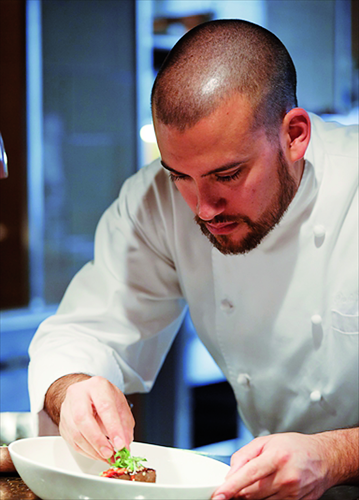Omnivore World Tour returns to Shanghai
Two locally based chefs on food culture and starring in culinary master class
Over the course of three days (June 18 to 20), the chefs will come together for a series of events, including master classes, pop-up dinners and the Omnivorous by Badoit Party. They will share their personal cooking philosophy, explore new cooking techniques and promote culinary cultural exchange between different cities.
"My dream was to unite the young generation of chefs into a strong network to allow the sharing of knowledge and culture," said Luc Dubanchet, the founder of Omnivore World Tour.
Launched in 2011, Omnivore World Tour holds culinary festivals in different cities annually, bringing together some of the world's greatest chefs and searching for new talent along the way. This is fourth time that Omnivore will be held in Shanghai.
The Global Times recently spoke with two Shanghai-based food experts, South Korean chef Bichna Yu from CHI-Q and American chef Paul Eschbach from Jean-Georges, to gain insight into their culinary art and secret recipes.
Both chefs will present their best dishes to the public during Omnivore World Tour's master class in Shanghai.
Less is more

Bichna Yu
Bichna Yu grew up watching her mother and grandma cooking traditional Korean cuisine. During her master class presentation, she will draw on this experience to shed light on the traditional way to cook napa cabbage kimchi.
"In Korea, kimchi is something you have to have in every single household. You can have thousands of different ways to make it. The napa cabbage kimchi, however, is the most representative of Korean cuisine," said Yu.
Her recipe is to first boil the napa cabbage in salt water to make it flexible. Then she will season each layer with a sauce made from chili powder, garlic, ginger, fish sauce and sugar before placing the seasoned napa cabbage into a sealed container for three days.
According to Yu, it is better to choose napa cabbage with a low water content; otherwise, it becomes very tender and mushy when pickled. Currently she is using napa cabbage sold in a local Shanghai market, but she is also willing to import from the northern part of China, where napa cabbage contains less water thanks to the region's cold and dry weather.
Her cooking philosophy is to keep it simple by choosing the freshest vegetables in season and using as few seasonings as possible. Because her ancestors were farmers, Yu learned at a very young age to appreciate nature's harvest. "I think it is very important to keep the original state of the food. With more cooking procedures, you destroy the flavor and change the taste and texture of the food," said Yu.
Changing palates

Paul Eschbach prepares a dish. Photos: Courtesy of the event organizers
American executive chef Paul Eschbach fell in love with cooking when he was 17 years old. "I like to make people happy through that," he said.
For this year's master class, Eschbach will present squab with the special sauce he uses for the dish at Jean-Georges. "We use Chinese tea, orange juice, a little sweet sauce and some Chinese wine to make a nice broth to go with the duck. We smoke the squab as well. It's very nice. It tastes smoky, sweet, spicy; all different types of flavors," said Eschbach.
The son of a diplomat, Eschbach has been to 10 countries. He believes that living abroad has given him a wider sense of the world. Eschbach pays close attention to the food culture in every new place he visits.
"The things happening in China are at a fast rate. Food, too," he said. He has devoted years to understanding Chinese food culture, as well as their palate and their dislikes.
"Chinese don't like to eat what they can get on the street. Their palates are changing. I have to make sure that I use the things they want to eat. After a few weeks, if the food is not selling well, I will change it to other things. It's a constant learning thing," said Eschbach.
Omnivore founder Luc Dubanchet has high hopes for the city's blossoming food culture. "Shanghai is an incredible spot for diversity of food," he said. "Although chefs are still considered as employees by restaurant, I'm sure that this status is going to change in the coming years. I think Shanghai is the best place in China to promote chefs as true creators."